Crony Capitalism, Human Rights, Prison Industry, Targeting Muslims, worker's rights
Podcast: Play in new window | Download
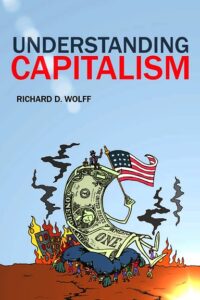
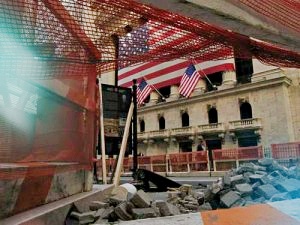
Understanding Capitalism
The great German playwright, and political figure, Berthold Brecht, observed that to understand fascism you have to understand capitalism, from whence it springs. Today, it is also helpful for us to understand that the rise of fascism in Germany 100 years ago, has parallels we can see now with the rise of fascism in the United States.
Prior to World War I, which began in 1914, the German working class and middle class were relatively prosperous. The German unions were strong and influential. Prior to World War I, Germany also had the largest and strongest socialist party in the world, and it was the second largest political party in the German Parliament. The German economy was booming. And German culture was the jewel of Europe.
This all came to a crashing end in 1917, when Germany was defeated in what was an inter-imperial war against the United States, France, Great Britain and Russia. The consequences of that defeat brought us fascism and World War II, 20 years later. In the 1920’s, inflation wiped out the savings of the German people. When the depression hit in 1929, the German working class was desperate. The ground was fertile for the rise of Adolf Hitler, a ruthless, cunning and violent demagogue.
Here in the United States, our economy boomed for 100 years, from the end of the Civil War until the 1970s. But since then, American workers have not made any progress. Their wages, in real terms, have not risen in 50 years! “Neo- liberalism”, which is just another word for aggressive capitalism, has wiped out 30 million industrial jobs in the US, starting in the 1980s. Women were driven back into the workforce. People had to work two jobs just to keep up.
In Germany, it was the Jews who were blamed. Here in the US, it is immigrants and people of color who are scapegoated. The demagogue Trump, like Hitler before him, is a captivating speaker and a very effective cult leader, who is now poised to take the power of the government and turn it against “we the people.”
Guest – Richard Wolff is Professor Emeritus from the University of Massachusetts, and the author of the forthcoming book, “Understanding Capitalism”. According to New York Times, Richard Wolff is, probably America’s most prominent Marxist economist. He is the founder of Democracy at Work and host of their national syndicated show Economic Update. Professor Wolff has authorized numerous books on capitalism and socialism, including most recently “The Sickness is the System: When Capitalism Fails to Save Us From Pandemics or Itself“, “Understanding Socialism“; and “Understanding Marxism”, which can be found at democracyatwork.info.
—–

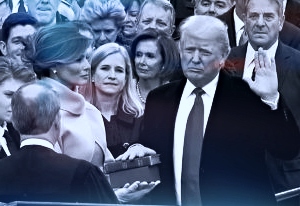
Present Danger Of Fascism In The United States
The rise of Donald Trump and his MAGA supporters has transformed American politics, perhaps more than anything else has since the gathering of forces of the rebellious slave owners in the south, a century and a half ago. His first four years in office were chaotic, uninformed programmatically, and not animated by any kind of cadre of capable administrators. It was, instead, full of his statements and actions that many critics deemed to be racist, sexist and Xenophobic.
He lost the election in 2020, although he received 74 million votes! As he runs for the Presidency again, this time he is talking rather openly about wanting dictatorial authority, if he is elected again.
And this time if he does win, he now has the aid of the right-wing Heritage Foundation, which has produced the 900-page “Project for 2025” document on how to radically change our country so as to make it far, far more conservative, providing far fewer rights to the American people, and allowing any president so inclined, to run the country as an authoritarian, a virtual dictator. He has an authoritarian right wing Supreme Court, which in its latest decision, aptly named “Donald Trump versus the United States of America,” has given the presidency carte blanche immunity, placing the president above the law, allowing the president to do almost anything he or she wants to do, as long as it’s deemed to be “an official presidential act”.
Today’s program is the lead off to a series of shows on fascism, how to resist it, and how to defend against it. I will be conducting this series with my co-host, Michael Smith, who cannot be with us today due to illness.
Guest – Chris Hedges, the journalist and author spent two decades as a foreign correspondent serving as the Middle East Bureau Chief and Balkan Bureau Chief for The New York Times where he was awarded the Pulitzer Prize. He is the author of 14 books including War is a Force That Gives us Meaning, Days of Destruction, Days of Revolt, which he co-wrote with the cartoonist Joe Sacco, and The Death of the Liberal Class.

—————————————-
Civil Liberties, Civil Rights, Human Rights, Prison Industry, Supreme Court, worker's rights
Podcast: Play in new window | Download


USPS: Concerns With Louis Dejoy And Election Integrity
Free elections can too easily turn into hollow formalities when coercion, manipulation, or biased governance replace voter choice and participation. The United States Postal Service has historically been one of the most trusted government institutions in the United States, with a strong reputation for reliability and nonpartisanship. Until now.
Louis DeJoy, a prominent Trump donor and former logistics executive, was appointed as Postmaster General in May 2020, just months before the 2020 presidential election. His tenure has been marked by a series of controversial reforms, including slowing mail delivery, removing mail sorting machines, reducing post office operating hours, and limiting overtime for postal workers. These changes have triggered widespread alarm, given the heightened dependence on mail-in voting during the COVID-19 pandemic.
Despite public outcry and congressional investigations, DeJoy continues to oversee an agency crucial to the functioning of our democracy. With the 2024 election on the horizon and the ongoing reliance on mail-in ballots—particularly in swing states—the stakes are high. Voters in rural areas, the elderly, and people with disabilities, often rely on it to cast their ballots. Any disruptions could disproportionately impact these communities and undermine public confidence in the electoral process.
We examine the potential impacts of delayed ballots, changes in USPS service standards, and the wider implications for voter turnout and trust in the system.
Guest – Chuck Zlatkin, legislative director of the New York Metro Area Postal Union.
—-
Sending a big thank you to station KKFI for their generous donation bringing us closer to our fundraiser goal. Please consider helping us reach our fundraiser goal. We’re getting close.
—-
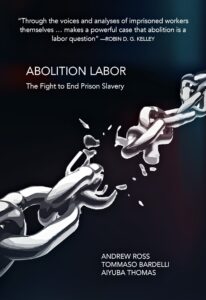
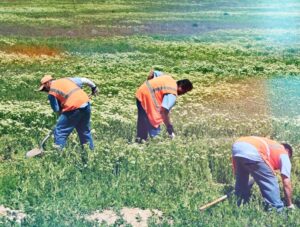
Abolition Labor: The Fight To End Prison Slavery
Operating in the secrecy of the nation’s more than 1,800 prisons, a kind of shadow slave culture is being fostered. Few Americans are aware of the exploitative and pervasive practice of forced prison labor. The 13th amendment to the US Constitution abolished slavery, but it made one exception: prison labor.
Prisoners are forced to work with minimal or non-existent wages, and often with no labor protections. Understanding the scope and implications of forced prison labor is crucial for anyone concerned with social justice and equity. It calls for a re-examination of our treatment of incarcerated persons and for alternatives that promote fairness for everyone, regardless of their legal status. By shining a light on this issue, we can advocate for reforms that prioritize rehabilitation over punishment and strive towards a more just and humane criminal justice system. A new book, Abolition Labor: The Fight To End Prison Slavery, provides an eye-opening overview of the extent of this problem.
Guest – Andrew Ross is a renowned social activist, author, and Professor of Social and Cultural Analysis at New York University, where he also directs the Prison Research Lab. Andrew has contributed to prominent publications like The Guardian, The New York Times, and The Nation. He has authored or edited over twenty-five books, with the recent work, Abolition Labor, co-authored with Aiyuba Thomas and Tommaso Bardelli.
Guest – Aiyuba Thomas recently earned his M.A. from NYU’s Gallatin School of Individualized Study and is an affiliate of the NYU Prison Research Lab. He currently serves as project manager for the Movements Against Mass Incarceration’s archival oral history project at Columbia University. There, he documents the experiences and challenges faced by those affected by the criminal justice system. His firsthand perspective and his extensive knowledge on the subject makes him a powerful voice in the conversation of abolishing forced prison labor.

——————–
Civil Rights, Death Penalty, Human Rights, Prison Industry
Podcast: Play in new window | Download
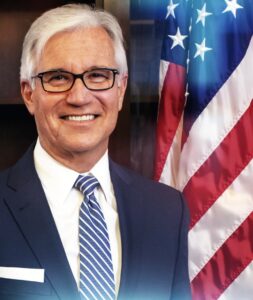
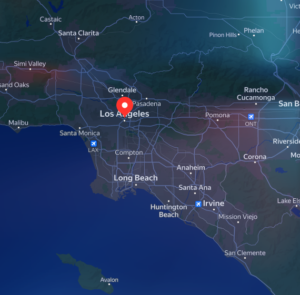
The California Criminal Legal System Reconsideration
In recent years, District Attorneys around the country in Los Angeles, Philadelphia, San Francisco, and elsewhere have broken the law and order mold as they look for better ways to address public safety, crime, prosecution, and sentencing in America, including a wholesale reconsideration of the death penalty.
To examine the criminal legal system in the United States, we’ve invited one of the leading progressive prosecutors in America, George Gascon, the District Attorney of Los Angeles County, to join us.
Guest – Attorney George Gascon began his career in law enforcement at the Los Angeles Police Department where he worked his way up the ranks from patrol officer to Assistant Chief of Police, overseeing operations for the more than 9,000 LAPD officers Then, in 2006, he was tapped to be Chief of Police in Mesa, Arizona, where he stood up to the hateful and anti-immigrant policies of then-Maricopa County Sheriff Joe Arpaio. In 2009, then-Mayor Gavin Newsom appointed Gascón to be San Francisco’s Chief of Police. Two years later, Newsom again turned to Gascón to fill a vacancy created when then-District Attorney Kamala Harris was elected California Attorney General. Gascón was re-elected San Francisco District Attorney twice.
He was the first Latino to hold that office, and the nation’s first Police Chief to become District Attorney. On December 7, 2020, he took office as the DA of LA County. He is also a former board member of the Council of State Governments Justice Center, a graduate of the FBI’s National Executive Institute and a former member of the Harvard University Kennedy School of Government’s Executive Session on Policing and Public Safety.
—-
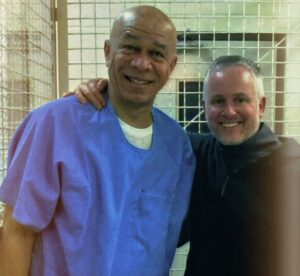

Maintaining Innocence Under Threat Of Execution: Bill Clark
We may be witnessing the dying days of the death penalty in the United States. 23 states have ended the use of capital punishment, while it remains on the books in 27 states, yet the number of executions are in decline. The U.S. public sector and political leaders are beginning to understand what abolitionists have always known: The death penalty is a relic of our racist past yet discrimination on the basis of race continues to plague the system. 55.8 percent of those executed are white, but 33.9 percent are Black and 8.4 percent are Latino/a, which is gruesomely out of proportion to the national population. Currently, 42 percent of death row inmates are white but a shameful 41 percent are Black.
Today, on Law and Disorder we are focusing on the state of California, where there are 650 inmates on death row, the largest number in the Western Hemisphere. 13 men have been executed since 1978. The last execution was in 2006. Due to a combination of court rulings and a moratorium imposed by Gov Gavin Newsom in 2019, there have been no executions in California in the last 18 years. Five inmates have been officially found innocent, all of whom were people of color. They join the 200 exonorees nationwide. Despite the moratorium in California, 17 people have still been sentenced to death in California — 80% of whom are Black or Latino.
The California Supreme Court is currently deciding whether to take up a historic petition filed in April by a coalition of civil rights and justice organizations arguing that racial discrimination in the administration of the death penalty in California violates the equal protection guarantee of the state constitution. The petition to the state Supreme Court cites more than a dozen studies showing race discrimination. One looked at more than 55,000 homicide cases in California between 1979 and 2018 and found that Black individuals were more than twice as likely to receive a death sentence as white individuals, while Hispanic individuals were 1.5 times more likely to receive a death sentence. California Attorney General Rob Bonta agreed in his response to the petition that the evidence of racial discrimination in capital punishment is “profoundly disturbing.”
So those are some of the facts which describe the capital punishment system in California and the Nation. But today on Law and Disorder we want to go beyond those raw statistics and take a look at the human cost of the death penalty by talking to someone who has been living under the threat of execution for 33 years. Bill Clark’s Film Project
Guest – Bill Clark joins us by phone from prison in Vacaville, California, where he has been housed since March of this year after his transfer from San Quentin, where he was incarcerated for 26 years. I have known Bill for 24 years. Despite his situation, he is a hopeful, resilient and creative person. He was convicted of two murders in the early 1990s and has steadfastly maintained his innocence as he continues to challenge his convictions and death sentences.

————————————
Civil Rights, Human Rights, Prison Industry, Supreme Court
Podcast: Play in new window | Download
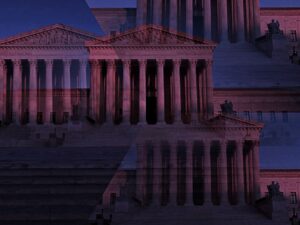
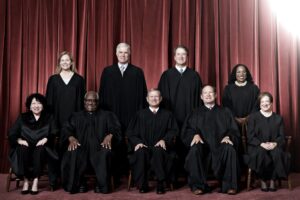
Two Very Important Supreme Court Decisions
When does the government cross the line from using its highly visible bully pulpit to advocate for policies and principles it has every right to promote into the prohibited zone of threatening to use its awesome powers to punish viewpoints it opposes by coercing others to refrain from doing business with the speaker.
In two very important recent decisions, the U.S. Supreme Court was asked to decide whether it is still the law of the land that a government entity’s “threat of invoking legal sanctions and other means of coercion” against a third party “to achieve the suppression” of disfavored speech violates the First Amendment.
In National Rifle Association v. Vullo, in a rare unanimous opinion written by Justice Sonia Sotomayor, the Court held that “Government officials cannot attempt to coerce private parties in order to punish or suppress views that the government disfavors.”
But the decision in the related case of Murthy v. Missouri, was not unanimous. In that case a federal district judge had ruled that the U.S. Surgeon General (Vivek Murthy) and other government officials violated the First Amendment by seeking to convince social media platforms to remove content the government deemed disinformation about COVID, the 2020 election and other subjects.
But on June 26, the Court punted. A 6 member majority – made up of both conservatives and liberals – held that the plaintiffs did not have standing. In dissent, three conservative justices said they would have found standing and on the merits they would have found a First Amendment violation.
Guest – Attorney David Cole argued the NRA case in the Supreme Court. He’s been the National Legal Director of the American Civil Liberties Union (ACLU) since 2016. He previously served as a staff attorney for the Center for Constitutional Rights. He has litigated a wide array of major civil liberties controversies and has personally argued 8 cases before the US Supreme Court and served as counsel in more than 30.
—-


Abolition Labor: The Fight To End Prison Slavery
Operating in the secrecy of the nation’s more than 1,800 prisons, a kind of shadow slave culture is being fostered. Few Americans are aware of the exploitative and pervasive practice of forced prison labor. The 13th amendment to the US Constitution abolished slavery, but it made one exception: prison labor.
Prisoners are forced to work with minimal or non-existent wages, and often with no labor protections. Understanding the scope and implications of forced prison labor is crucial for anyone concerned with social justice and equity. It calls for a re-examination of our treatment of incarcerated persons and for alternatives that promote fairness for everyone, regardless of their legal status. By shining a light on this issue, we can advocate for reforms that prioritize rehabilitation over punishment and strive towards a more just and humane criminal justice system. A new book, Abolition Labor: The Fight To End Prison Slavery, provides an eye-opening overview of the extent of this problem.
Guest – Andrew Ross is a renowned social activist, author, and Professor of Social and Cultural Analysis at New York University, where he also directs the Prison Research Lab. Andrew has contributed to prominent publications like The Guardian, The New York Times, and The Nation. He has authored or edited over twenty-five books, with the recent work, Abolition Labor, co-authored with Aiyuba Thomas and Tommaso Bardelli.
Guest – Aiyuba Thomas recently earned his M.A. from NYU’s Gallatin School of Individualized Study and is an affiliate of the NYU Prison Research Lab. He currently serves as project manager for the Movements Against Mass Incarceration’s archival oral history project at Columbia University. There, he documents the experiences and challenges faced by those affected by the criminal justice system. His firsthand perspective and his extensive knowledge on the subject makes him a powerful voice in the conversation of abolishing forced prison labor.
—————————————-
Civil Liberties, Gaza, genocide, Prison Industry, Racist Police Violence, Targeting Muslims, U.S. Militarism, Violations of U.S. and International Law, War Resister
Podcast: Play in new window | Download

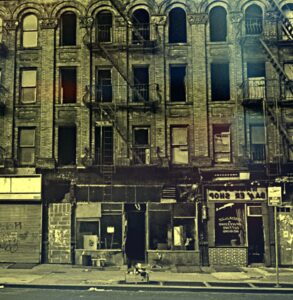
I Dare Say: A Gerald Horne Reader
Angela Davis once stated “radical simply means grasping things at the root.” This makes understanding possible. What are the roots of our present dilemma? Where did capitalism come from? And what accounts for its great success? Where did racism come from? When was it implanted? Why are alternatives to the capitalist Democratic and Republican parties so feeble?
What did Malcolm X really stand for and what did he try to accomplish before he was assassinated at age 39, the same age that his contemporary Martin Luther King was assassinated five years later? How does this contribute to the weakness of our movement?
This weakness can be traced back most immediately to the anti-Communist witchhunt of the 1940s and 1950s and the destruction of the left-wing; of our once powerful trade unions beginning in 1947.
The danger that Malcolm X. presented to the powers that be are best understood by his internationalism, his reaching out to leaders in Africa, his desire to go to the United Nations to mobilize against American racism.
Today’s political activists are drawn to the works of historians to appreciate where we are at, how we got here, and what to do next.
Guest – Gerald Horne has written about these profound events. His reader I Dare Say has just been published by OR books. Cornell West called Gerald Horne is “one of the great historians of our time.“ Horne approaches his study of history as a politically engaged scholar with an insightful and necessary partisan stance. He graduated from both the University of California law school and Columbia University where he got his PhD in history. Horne has been active as a leader of the National Conference of Black Lawyers and is the author of 40 books as far reaching as the origins of capitalism, racism, settler colonialism, boxing and jazz. He is currently a chaired professor of African-American history at the University of Houston.
—-


Attorney Michael Deutsch on Repression of the Pro-Palestinian Movement
Historically, when the people of our nation rise up in massive opposition to policies and actions undertaken by their government that are deemed essential to its foreign or domestic policies, various governmental agencies invariably begin the process of trying to shut down or seriously weaken the peoples’ movements against those policies and actions. That’s what happened in the 1960’s and early ‘70’s, during the movement against the U.S. war in Vietnam. In the ‘60’s when the movement for civil rights was so active in our nation. Or more recently in response to the movement on behalf of immigrants’ rights. And so it is not surprising that the pro-Palestinian movement in the United States, which in the wake of how Israel is conducting its war in Gaza, has exponentially increased in size and in public view, would immediately become the focus of renewed governmental, as well as private, repression in America. Colleges and universities shut down groups like Students for Justice in Palestine and Jewish Voice for Peace; college presidents were called to testify before Congress about what they were, or were not, doing to combat alleged increases in anti-Semitism on their campuses; the U.S. House of Representatives initiated, and continues, an investigation of the pro-Palestinian movement; private employers have withdrawn job offers to students and others who joined the anti-Israel protests; and authors and speakers deemed too supportive of the Palestinian cause continue to be disinvited or banned from speaking at public forums.
Secrets And Lies: The Persecution Of Muhammad Salah
Often, governmental efforts to intimidate or undermine these peace and social justice movements include actions that are not visible to the general public. Secret actions. Actions such as sending undercover agents into the targeted protest groups in order to disrupt the group. Electronic spying on the groups and group leaders escalates. And, as the case with the movement now protesting Israel’s actions in its war in Gaza, a war backed by the United States both politically and militarily, various U.S. policing agencies are now consulting with, visiting with, and working in concert with governmental agencies in Israel.
Guest – Michael Deutsch, a lawyer with the famed human and civil rights People’s Law Office in Chicago, Illinois. Michael has also served as the Legal Director for the Center for Constitutional Rights in New York City. In the course of his career, he has been a criminal defense lawyer for the rebelling prisoners at Attica, and later was a coordinator in the Attica civil lawsuit where, after two decades of litigation there was a settlement of 12 million dollars in damages. Mr. Deutsch has also represented Black Panther Party members, Puerto Rican Nationalist prisoners in the 1950’s, who won an unconditional sentence commutation from President Carter in 1979; and more recently Michael represented Rasmea Odeh, the Deputy Director of the Arab-American Action Network, a former Palestinian prisoner and torture survivor.

——————————————-
CIA Sponsored Terror, Civil Rights, Human Rights, Prison Industry, Truth to Power, U.S. Militarism, Violations of U.S. and International Law, War Resister
Podcast: Play in new window | Download


What Kind Of Nation?
What kind of nation cuts off of food, water, medicine, electricity, and fuel to 2 1/3 million Palestinians and then bombs them as they sit trapped in the open air prison which is the Gaza Strip? What kind of national leader in his capacity as Israeli Minister of Defense, says “We are fighting human animals and we are acting accordingly.“ Israeli Prime Minister, Benjamin Netanyahu promised that “We will turn Gaza into a deserted island.”
What kind of a nation vetoes a cease-fire as the US did in a 13 to 1 vote when it was proposed at the United Nations Security Council? The Israeli and American nations finds themselves morally isolated on the world stage.
The American government supplies the weapons of war to a nation that has so far annihilated at least 20,000 people, including 8000 children. The Israelis use weapons made in the US and paid for by our tax dollars.
American foreign policy is driven by the military industrial complex. It’s a country whose weapons industry is closely allied with the weapons industry of Israel and a country whose government is heavily influenced by the Israeli lobby, a lobby that should be forced to register as an agent of a foreign country.
Guest – Aaron Maté about the continuing genocide in Gaza, which is now approaching 100 days. He is a journalist with The Gray Zone where he hosts “Pushback“. He is the co-host of Useful Idiots. In 2019 Aaron Maté won the Izzy award for outstanding achievement in independent media for his Russiagate coverage in The Nation.
—-
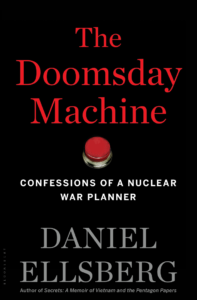

Unilateral Sanity Could Save The World: Nothing Can Be Changed Until Its Faced
As we begin 2024, the Bulletin of Atomic Scientists just reset its nuclear doomsday clock for the 24th time in its 76-year history. They created the doomsday clock just after WW2 to visually represent the threat of global nuclear annihilation. Although the precise time won’t be announced until later this month, the most recent change was just one year ago: in January 2023, when the clock was moved forward to 90 seconds til midnight – the closest to midnight ever.
What will 2024 bring? Will we get swept up in momentum and fervor toward global catastrophe? Or can we muster the will and courage to act … and try to save one another – other animals, the earth, and ourselves?
In his article, Unilateral Sanity Could Save the World, our guest: author and political analyst Norman Solomon, invokes Antonio Gramsci’s philosophy of keeping a “pessimism of the intellect,” but “an optimism of the will.”
Guest – Norman Solomon is a long-time associate of Fairness and Accuracy in Reporting, the national director of RootsAction.org, and the Executive Director of the Institute for Public Accuracy. His books include War Made Easy: How Presidents and Pundits Keep Spinning Us to Death; and his latest book, War Made Invisible: How American Hides the Human Toll of its Military Machine which was published by the New Press in June 2023.
Hosted by attorneys Michael Smith and Maria Hall

—————————–






















